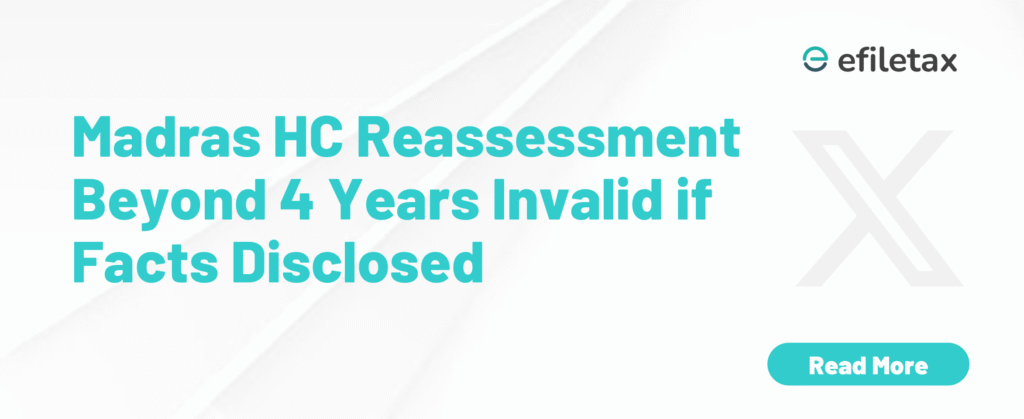
Reassessment Beyond 4 Years: What Madras HC Said
The Madras High Court has reaffirmed a crucial principle under Section 147 of the Income-tax Act, 1961: if the assessee has disclosed all material facts fully and truly, any attempt to reopen assessments after 4 years is invalid—unless there’s proof of failure on the assessee’s part.
In this case, the Court quashed the Revenue’s reassessment proceedings for AY 2014–15, initiated after 4 years from the original assessment, citing lack of new material and full disclosure by the assessee.
Understanding the 4-Year Rule under Section 147
Section 147 empowers the Assessing Officer to reopen past assessments if:
- Income has escaped assessment
- And reasons are recorded in writing
However, as per first proviso to Section 147, when 4 years have passed from the relevant assessment year, reassessment is allowed only if there was:
- Failure by the assessee to disclose fully and truly all material facts
Key Takeaways from the Madras HC Ruling
| Particulars | Details |
|---|---|
| Court | Madras High Court |
| Case | M/s.Kuthambakkam Farmers Producer Co. Ltd. vs ITO |
| Assessment Year | 2014–15 |
| Reopening Year | 2021 (after 7 years) |
| Main Ground | Assessee had disclosed all material facts in original assessment |
| Verdict | Reopening held invalid |
Why This Ruling Matters
- Limits arbitrary reassessment: Reaffirms that Revenue can’t reopen cases merely on change of opinion.
- Protects compliant taxpayers: Full disclosure shields taxpayers from prolonged scrutiny.
- Clarifies legal threshold: Without fresh material or omission by assessee, Revenue has no right to reopen after 4 years.
Legal Reference: Section 147 Proviso
“Provided that where an assessment under section 143(3)… has been made for the relevant assessment year, no action shall be taken under this section after the expiry of four years… unless any income chargeable to tax has escaped assessment by reason of the failure on the part of the assessee to disclose fully and truly all material facts…”
Expert Insight:
📌 Practical Tip: Always document all disclosures made in ITR and during scrutiny, including supporting annexures. This can be your strongest defense if reassessment is initiated after 4 years.
What Should Taxpayers Do?
- If you receive a Section 148 notice after 4 years, verify whether you had disclosed all facts earlier.
- Check whether the AO has new tangible material or is simply revisiting old facts.
- File a preliminary objection citing the 4-year bar under Section 147.
- If reassessment persists, approach High Court under Article 226 for relief.
Related Reading
➡️ How to Respond to a Notice Under Section 148
➡️ Understanding Time Limits in Income Tax Reassessment
FAQs
Q1. What is the time limit for reopening cases under Section 147?
Normally up to 4 years; beyond that only if assessee failed to disclose material facts.
Q2. Can reassessment be done on mere change of opinion?
No. Courts have repeatedly ruled that a mere change of opinion is not valid ground.
Q3. What documents help prove full disclosure?
ITR acknowledgments, computation statements, audit reports, and submission copies during original assessment.
Summary
The Madras High Court ruled that reassessment under Section 147 beyond four years is invalid if the taxpayer has fully disclosed material facts during the original assessment. The Revenue must prove nondisclosure to justify delayed reopening.
Conclusion
This Madras High Court ruling is a solid precedent that strengthens taxpayer protection against delayed reassessment. If you’ve been fully compliant, the 4-year clock works in your favour.